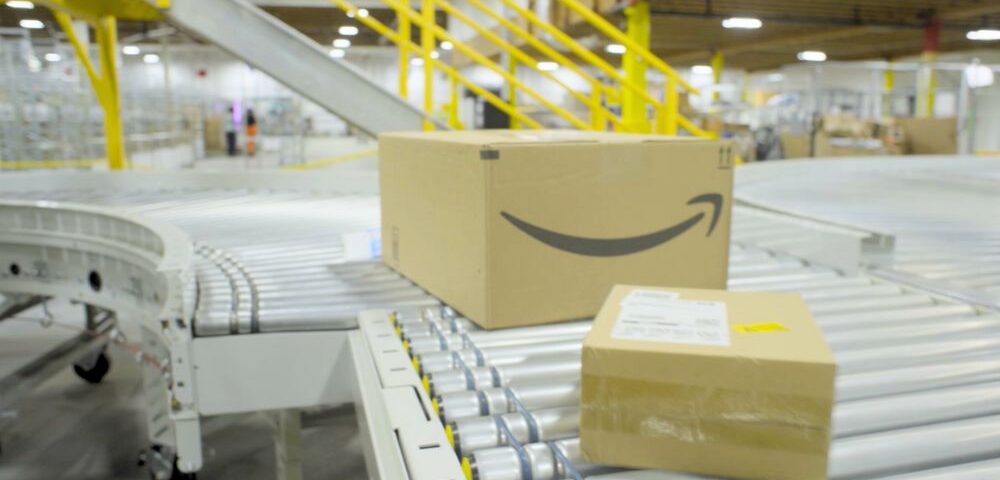- Have any questions?
- 888-432-8878
- steve@sebackground.com

Productivity vs. Privacy—Wells Fargo Fired Employees For Faking Activity
June 18, 2024
Confused about Workplace Etiquette Rules? You’re Not Alone
June 20, 2024California recently fined Amazon for labor law violations at two warehouses, one in Redlands and another in Moreno Valley. Amazon was fined $5.9 million USD in total after the Labor Commissioner’s Office determined that the company was violating California’s warehouse quota laws. Amazon warehouses have frequently been brought up for their safety measures and the excessive pressures placed on employees to work at a fast, unrelenting pace. The Warehouse Quota Law that went into effect in 2022, requires a business to provide written notice of any quotas that employees are expected to meet and Amazon failed to do this, leading to the allegations of labor law violations.

Image: Amazon
Amazon’s Labor Law Violation to Cost the Company $5.9M
A press release by California’s Department of Industrial Relations brought Amazon’s California quota violations to light. The press note highlighted the role of the Labor Commissioner’s Office in investigating the matter and the aspects that were noted to be problematic at the multimillion-dollar company. The investigation was supported by the Warehouse Worker Resource Center, which is a nonprofit organization that focuses on ways to improve the working conditions of warehouse workers.
According to the allegations, Amazon’s labor law violations in California occurred as a result of the company overlooking the Warehouse Quotas law, a legal precaution that was drawn up in 2021 as Assembly Bill 701, intended for the protection of warehouse workers.
What Does the Warehouse Quotas Law Require From Employers?
According to the law, employers are required to provide written notice of any quotas that employees are required to meet on the job. Employees need to know what is expected of them and how they are required to manage their time. The consequences and disciplinary action that will be taken in case of failure also need to be mentioned along with the quotas.
More importantly, the law is a way to maintain a formal record of the company’s requirements and expectations, ensuring all conversations around productivity are out in the open. These quotas include any metrics the company wants to establish such as the number of tasks employees need to perform per hour. The pressure to meet quotas often forces employees to work overtime, skip meals, avoid taking any breaks, and even overlook their safety in favor of speed. When employees don’t know the quotas by which their performance is being evaluated, they’re forced to keep working to ensure they don’t underperform.
According to the press release, “this law defines a quota as work that must be performed at a specified speed or the worker suffers discipline. It also places limits on quotas that prevent compliance with meal or rest periods, use of bathroom facilities, or compliance with occupational health and safety laws.” Essentially, it gives employees and regulators a way to ensure that the organization has reasonable quotas in place that don’t overwork the employees. The law was put in place as a response to complaints about Amazon’s safety risks and hazardous working conditions and the immediate violation shows that further regulations might be necessary.
Amazon Denies California Quota Violations
In response to the labor law violation allegations, Amazon claimed that it did not have any quotas to disclose as it used a peer-to-peer evaluation system to keep the work in check at their warehouses. As per Labor Commissioner Lilia García-Brower, however, Amazon’s preferred setup was “exactly the kind of system that the Warehouse Quotas law was put in place to prevent.” The Labor Commissioner’s Office remains insistent that Amazon’s California quota violations are a serious problem and that the company likely has hidden quotas in place as a means to evaluate workers—quotas that it has not revealed to its employees.
Amazon evidently didn’t agree with the decision to be fined $5.9 million USD. Spokesperson Maureen Lynch Vogel told Engadget, “The truth is, we don’t have fixed quotas. At Amazon, individual performance is evaluated over a long period of time, in relation to how the entire site’s team is performing. Employees can — and are encouraged to — review their performance whenever they wish. They can always talk to a manager if they’re having trouble finding the information.”
Amazon May Soon Have to Worry About More Than Just the $5.9M Fine In California
Amazon labor law violations in California may be sparking a debate on the working conditions in the present, but the organization has been repeatedly criticized for being too harsh on its workers. The company has stringent surveillance measures in place that watch and evaluate workers and their performance on the job around the clock, leaving little room for them to take a break. Such working conditions drain workers and further impair their efficiency and this cycle repeats over time.
A federal bill, the Warehouse Worker Protection Act, has been discussed to oversee the work done at warehouses and its impact on employees, similar to the California law that Amazon was accused of violating. “Amazon has perfected a punishing quota system that pushes workers to and beyond their physical limits,” said Ed Markey, a member of the Health, Education, Labor and Pensions Committee’s Subcommittee on Employment and Workplace Safety according to CNBC. “They set requirements for how many packages workers have to scan without telling workers what those requirements are. Then they fire workers who fail to win their impossible game.”
Apart from Amazon’s California quota violations, several warehouses that belong to the company are also reportedly under investigation by OSHA and the U.S. Attorney’s Office. Assessments are underway to check whether Amazon underreports the number of injuries that occur on the job. This could be another sign of the unmanageable work conditions reported at the company warehouses.
Amazon’s quick delivery policies may be beneficial to the customer, but workers behind the scenes are reportedly put through grueling conditions to make it possible. Amazon’s labor law violations are not going to disappear from the limelight anytime soon and the company will have to explain its plan moving forward and prove its intentions to acknowledge the well-being of its workers.
The post Amazon Labor Law Violation in California Lands a $5.9M Fine appeared first on The HR Digest.
Source: New feed




